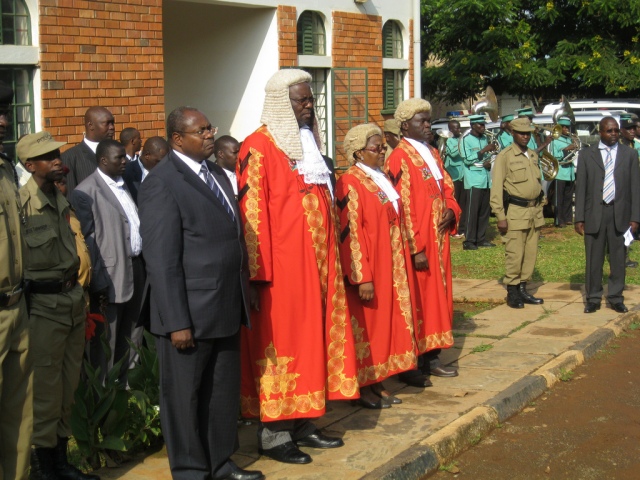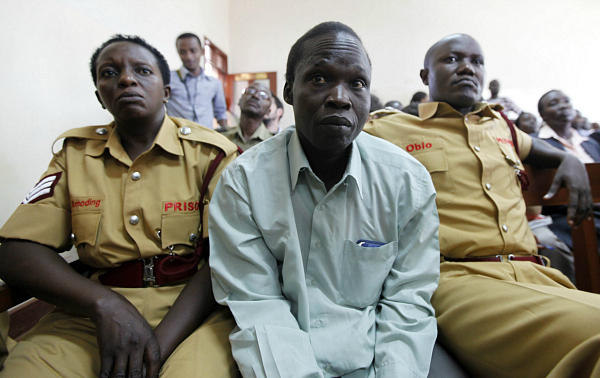Note: JRP’s photo from the Kwoyelo trial opening was featured in this post.
“The Kwoyelo Trial: A Final(?) Roundup,” Justice in Conflict, 13 February 2012
http://justiceinconflict.org/2012/02/13/the-kwoyelo-trial-a-final-roundup/
By Patrick Wegner
Last summer Justice in Conflict regularly reported on the trial of former LRA Commander Thomas Kwoyelo. After being arrested by the Uganda People’s Defence Forces (UPDF) in the Democratic Republic of Congo (DRC) in 2009, the Ugandan Department of Public Prosecutions (DPP) decided to charge Kwoyelo with war crimes under the Geneva Conventions and with crimes under national law.
The trial received considerable national and international attention as it was the first case of the newly created International Crimes Division (ICD) of the Ugandan High Court. The ICD had been founded in reaction to questions of accountability that arose during the Juba peace talks between the Government of Uganda (GoU) and the LRA. Meanwhile the Ugandan Parliament has passed the International Criminal Court (ICC) Act, which allows the ICD to prosecute Rome Statute crimes on the domestic level.
In a nutshell, the ICD referred the Kwoyelo case to the Constitutional Court when Kwoyelo’s defence lawyers protested that Kwoyelo had been denied amnesty under the Amnesty Act. In their view, this constituted a violation of equal treatment under the Ugandan Constitution. The Constitutional Court decided in late September 2011 that Kwoyelo should be eligible for amnesty and ordered the ICD to cease the case against him.
Even though the case was stopped, Kwoyelo remained in detention. He then decided to sue the GoU for illegal detention and petitioned the Ugandan High Court for amnesty on 23rd of November 2011. The High Court indeed ruled that Thomas Kwoyelo should be given amnesty and be set free. The Department of Public Prosecutions and the Amnesty Commission are the two competent institutions in this case and decided to meet to consult the Kwoyelo case after the High Court ruling. In early February the Department of Public Prosecutions again denied amnesty to Thomas Kwoyelo, citing that there can be no amnesty for charges of war crimes. Thomas Kwoyelo thus remains imprisoned in Luzira Prison in Kampala to date.
There are several conclusions that can be drawn out of the way the first domestic war crimes trial in Uganda developed. First and foremost, the ongoing back and forth concerning Thomas Kwoyelo’s amnesty again underlines that Uganda is at the crossroads with transitional justice. The actions of the DPP hint at a re-orientation towards more accountability and less amnesty in the future. The DPP has made that clear by repeatedly denying amnesty to Kwoyelo, despite court orders, and by announcing that it has prepared additional cases against former LRA rebels that it will pursue should Kwoyelo be found guilty. As far as I am aware there is no explicit government position on how amnesty and prosecution should relate to each other in the future, and the lack of clarity might well spark fears and unrest among LRA returnees as I have described in a piece last summer.
Secondly, the first case of the ICD has arguably also shown that demands for more positive complementarity, meaning more domestic trials, in ICC cases should be voiced more carefully. Creating institutions that are legally able to try ICC cases in the situation countries is an important goal. I have frequently argued for more positive complementarity at the ICC myself.
Yet just creating these institutions is not enough. One has to ensure that appropriate laws are in place and that the court is qualified to deal with international war crimes cases. There are several examples of how things went wrong in this context at the ICD. In general the GoU was seemingly in a hurry to demonstrate that the ICD was up and running by presenting a first case and preferably a conviction. Some sources have accused the GoU of presenting the ICD with a pre-determined budget and timeline for a ruling in the Kwoyelo case.
It is important to acknowledge that the ICD is doing something that has never been done anywhere else in Africa. Creating a High Court Division competent of ruling on Rome Statute Crimes is a novel development. The judges include well qualified experts with experience in international criminal law and most of them have attended best-practice training at the ICC in The Hague according to the ICD Registry.
Despite the ICD Project being generally commendable, there are some other problems that emerged from the rushed effort to try a first case at the ICD as quickly as possible. The case before the ICD showed that witness protection laws in Uganda are inadequate. The judges are only able to order ad-hoc measures to protect witnesses if there are clear signs for danger. The Justice Law and Order Sector (JLOS) of the Ugandan Government is working on laws to alleviate this problem, but results are not expected before mid-2012.
Last, but not least, the ICD is so far working with guiding principles instead of full rules of procedure. The guiding principles are open for best practice approaches from other cases of international criminal law, which makes them highly flexible. Yet, a lack of full rules of procedures may lead to problems of fair trial or delays in some cases. All in all the Kwoyelo trial has proven that the ICD is a politically independent institution that is to be taken seriously. Still, it has also shown the remaining weaknesses in the systems and has highlighted the danger of cases becoming politicized. The fact that Kwoyelo is still in jail despite numerous court rulings seems to be an indicator that the DPP was trying to make a political point by indicting Kwoyelo.

